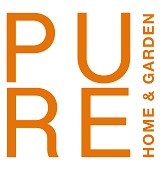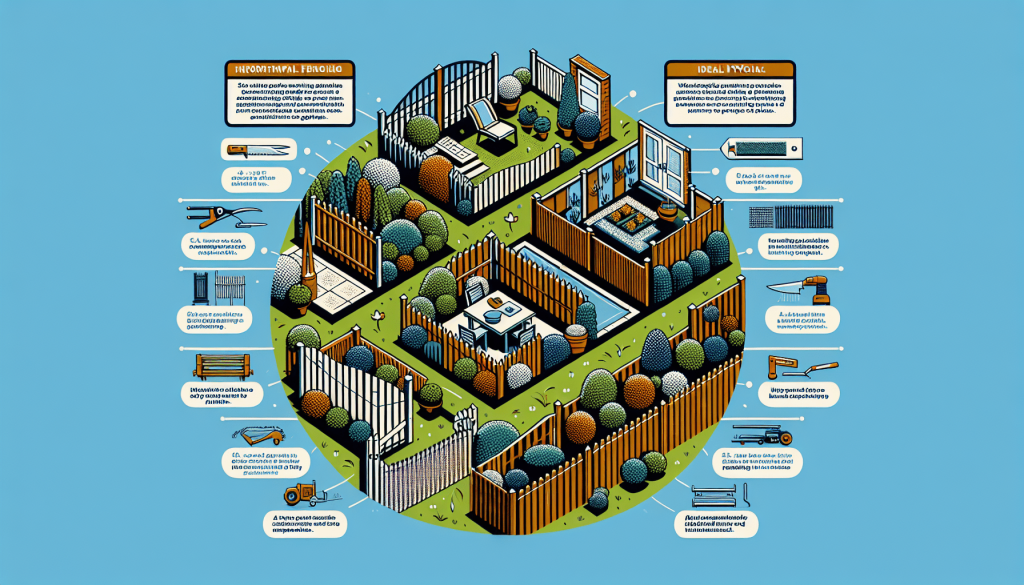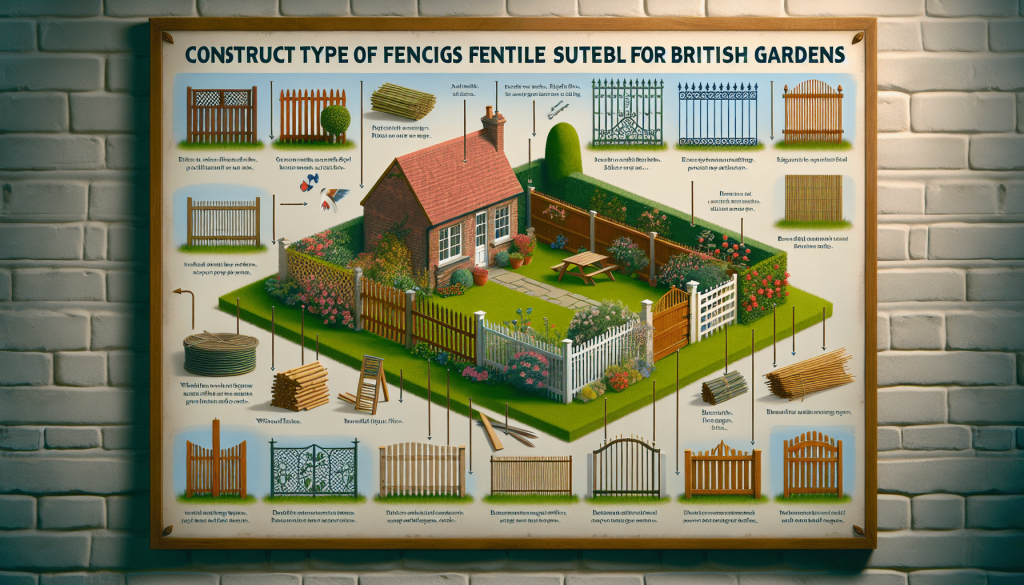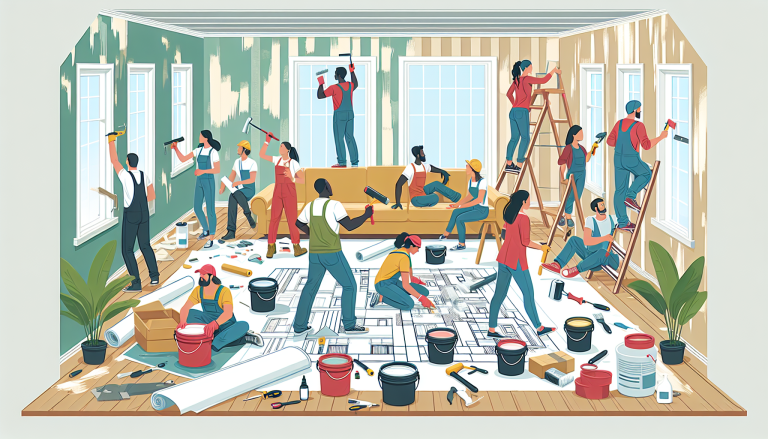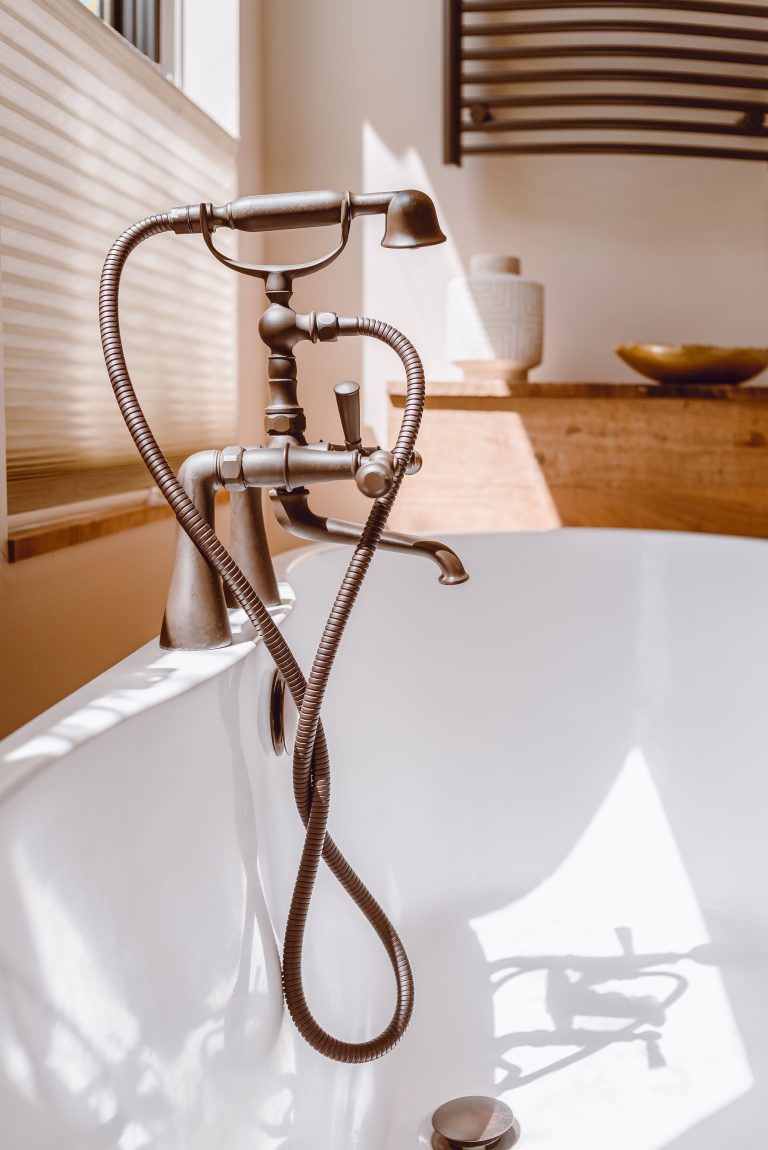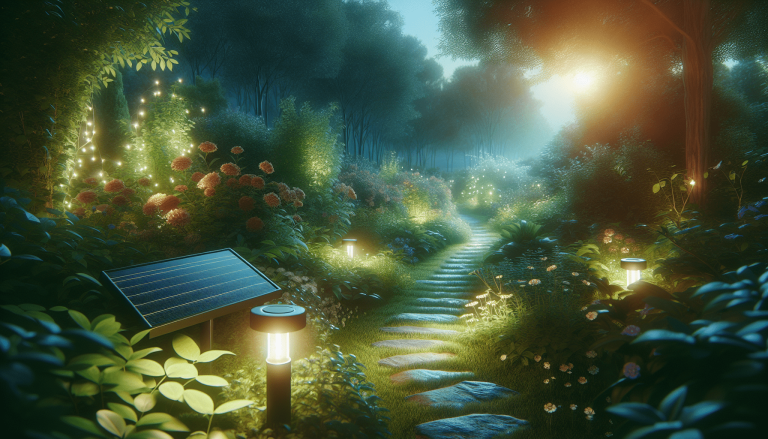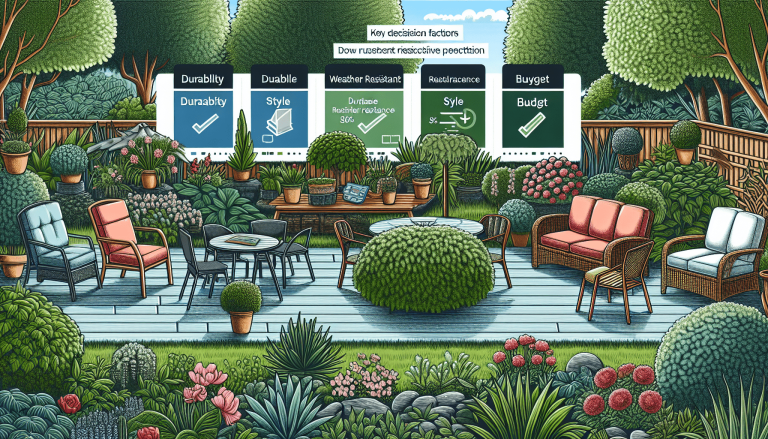Thinking about adding a new fence to your garden in the UK? With so many options to choose from, it can feel overwhelming to find the right type of fencing. But worry not, because in this article, we will guide you through the process of selecting the perfect fencing for your garden. From considering the purpose and style to taking into account maintenance and regulations, we’ve got you covered. So grab a cup of tea, sit back, and let’s find the ideal fencing solution for your garden in the UK.
Table of Contents
ToggleConsider the Purpose of the Fence
When choosing the right type of fencing for your garden in the UK, it is important to first consider the purpose of the fence. This will help you determine what features and characteristics are most important for your specific needs. There are several common purposes for installing a fence, including privacy, security, and decoration.
Privacy
If privacy is a top priority for you, then you’ll want to choose a type of fencing that provides a high level of privacy. Solid panel fences made of wood, metal, or vinyl are often the best option for creating a private space in your garden. These fences have no gaps or openings, ensuring that your garden activities remain hidden from view.
Security
If security is a concern, then you’ll want to choose a fence that provides a strong and secure barrier. Metal fences are typically the most secure option, as they are difficult to climb and provide a sturdy deterrent to potential intruders. Additionally, choosing a fence with a height of at least six feet can further enhance security.
Decoration
In addition to providing privacy and security, a fence can also add aesthetic value to your garden. If decorative appeal is important to you, then you’ll want to choose a fence that complements the style of your garden and enhances its overall aesthetics. Wooden fences are often a popular choice for adding a touch of natural beauty to any garden.
Evaluate the Material Options
Once you have determined the purpose of your fence, it’s time to evaluate the different material options available. Each material has its own unique characteristics and advantages, so it’s important to choose one that suits your needs and preferences.
Wood
Wood is a traditional and versatile option for garden fencing. It offers a natural and timeless look that can complement any garden style. Wood can be painted or stained in a variety of colors, allowing for customization. However, it does require regular maintenance, such as staining or painting, to keep it looking its best.
Metal
Metal fences, such as wrought iron or steel, offer a high level of durability and security. They can withstand harsh weather conditions and are difficult to damage. Metal fences often feature intricate designs, adding a touch of elegance to your garden. However, they may require some maintenance to prevent rusting.
Vinyl
Vinyl fences are known for their low maintenance requirements and long-lasting durability. They are resistant to rot, fading, and warping, making them an excellent choice for the unpredictable British weather. Vinyl fences are available in a variety of styles and colors, allowing you to find the perfect match for your garden.
Composite
Composite fences are made from a combination of wood fibers and recycled plastic. They offer the natural look of wood with the low maintenance requirements of vinyl. Composite fences are highly durable and resistant to rot, insects, and weather damage. They are also available in a variety of colors and styles to suit your garden’s needs.
Assess the Maintenance Requirements
When choosing a type of fencing for your garden, it’s important to consider the maintenance requirements of each material. This will help you determine how much time and effort you are willing to invest in preserving the appearance and durability of your fence.
Durability
The durability of a fence is an important factor to consider, especially in the UK where the weather can be unpredictable. Wood fences, for example, may require regular staining or painting to protect against rot and maintain their structural integrity. Metal and vinyl fences, on the other hand, are generally more durable and require minimal maintenance.
Weather Resistance
The British weather can be harsh, with frequent rain and strong winds. It is essential to choose a fence material that can withstand these weather conditions. Some materials, such as vinyl and metal, are inherently resistant to moisture and do not rot or warp easily. Wood fences, on the other hand, may require additional treatments or coatings to protect against water damage.
Treatment
Different fence materials may require different types of treatments to maintain their appearance and durability. Wood fences often require regular staining or painting to protect against rot, insect damage, and weathering. Metal fences may need to be inspected for rust and treated accordingly. Vinyl and composite fences, on the other hand, typically require minimal to no treatments, making them low maintenance options.
Check Local Regulations and Neighborhood Guidelines
Before installing a fence in your garden, it is important to check local regulations and any guidelines set by your homeowners association (HOA). This will ensure that your fence complies with any restrictions or limitations in your area.
Local Planning Regulations
Local planning regulations vary by area, so it’s important to research the specific requirements for installing a fence in your garden. Some areas may have restrictions on the height or materials used for fences, while others may require a permit or approval before installation. By understanding your local regulations, you can avoid potential fines or penalties.
Homeowners Association (HOA) rules
If you belong to a homeowners association, you may need to adhere to specific guidelines regarding the type, height, and appearance of your fence. HOAs often have their own set of rules and guidelines in order to maintain a uniform aesthetic within the neighborhood. It’s important to consult your HOA’s guidelines and seek approval before installing a fence.
Take Into Account the Style and Aesthetics
The style and aesthetics of your fence can greatly contribute to the overall look and feel of your garden. Consider the following factors when choosing a fence style that complements your garden’s design.
Traditional
If your garden has a traditional design, a wooden fence may be the ideal choice. Wood fences have a timeless appeal that can enhance the charm and character of a traditional garden. Consider different designs, such as picket or panel fences, to find the perfect fit for your garden.
Contemporary
For a more modern and contemporary garden, consider a sleek and minimalist fence design. Metal or vinyl fences with clean lines and minimal embellishments can create a stylish and contemporary look. Choose a color and style that complements your garden’s overall design aesthetic.
Rustic
If you have a rustic or cottage-style garden, a fence made of wood or composite materials can help create a cozy and inviting atmosphere. Consider a fence with a weathered or distressed finish to enhance the rustic charm of your garden.
Matching Surroundings
It is important to choose a fence that complements the overall style and aesthetics of your garden. Consider the existing features and materials in your garden, such as plants, hardscaping, and architectural elements. Select a fence that harmonizes with these elements to create a cohesive and visually pleasing outdoor space.
Consider the Level of Privacy Desired
The level of privacy you desire in your garden will determine the type of fence you should choose. Consider the following options when determining the level of privacy that is right for you.
Open
If you prefer an open and spacious feel in your garden, an open-style fence may be suitable. These types of fences typically have larger gaps between the panels or slats, allowing for visibility to the surrounding area.
Semitransparent
Semitransparent fences offer a balance between privacy and visibility. They have smaller gaps or partial coverage that provides some privacy, while still allowing sunlight and airflow. This option is often favored in suburban areas where privacy is desired, but still maintaining a connection with the neighbors is important.
Solid Panels
For maximum privacy, solid panel fences are the ideal choice. These fences have no gaps or openings, providing a complete barrier to prying eyes. Solid panel fences are commonly used in densely populated areas or for creating secluded spaces within the garden.
Evaluate the Security Features
When it comes to security, there are certain features to consider when choosing a fence for your garden.
Height
The height of your fence plays a crucial role in enhancing security. Higher fences can act as a deterrent to potential intruders, as they are more difficult to climb. A fence with a height of at least six feet is recommended for optimal security.
Gates
Gates provide access to your garden and are an important consideration when it comes to security. Choose gates that are sturdy and equipped with secure locks. Consider adding features such as automatic closing mechanisms or even electronic security systems for added peace of mind.
Locks
The type of lock you choose for your gate can significantly impact the security of your garden. Opt for high-quality locks that are resistant to tampering and provide secure access control. Discuss with your fence installer about the best lock options available for your chosen fence material.
Assess the Cost and Budget
It is important to consider your budget and the overall cost of the fence, including both the initial investment and ongoing maintenance costs.
Initial Investment
The cost of the fence itself will vary depending on the chosen material, style, and size of the fence. Wood and metal fences are often more affordable options compared to vinyl or composite. Keep in mind that more durable and high-quality materials may have a higher initial cost, but can save you money in the long run due to their longevity.
Maintenance Costs
Consider the ongoing maintenance costs associated with each fencing material. Wood fences often require regular maintenance, such as staining or painting, which can add up over time. Vinyl and composite fences, on the other hand, require minimal upkeep and can save you money in the long term.
Consider the Environmental Impact
When choosing a fence for your garden, it’s important to consider the environmental impact of the materials you choose.
Sustainability
Opt for materials that are sustainably sourced or made from recycled materials. Some wood fences may be certified by organizations such as the Forest Stewardship Council (FSC), ensuring that they are responsibly harvested. Additionally, vinyl and composite fences are often made from recycled materials, reducing their environmental impact.
Eco-friendly Options
Consider eco-friendly options such as bamboo or willow fences. These natural materials are renewable and biodegradable, making them a more sustainable choice for your garden. Bamboo fences, in particular, are known for their fast growth and resilience.
Consult Professionals and Get Recommendations
Finally, consult professionals and seek recommendations to ensure you choose the right type of fencing for your garden in the UK.
Garden Designers
Seek the advice of garden designers who specialize in creating outdoor spaces. They can provide valuable insights on how different types of fences can enhance the overall design and functionality of your garden.
Fence Installers
Consult with professional fence installers who can offer expert advice on the different materials and styles available. They can assess your specific needs and provide recommendations based on your budget and preferences.
Neighbors
Speak to your neighbors who have recently installed fences in their gardens. They can provide firsthand experiences and recommendations based on the type of fence they have chosen. Additionally, they may provide insights on any potential challenges or benefits they have encountered.
By considering the purpose of the fence, evaluating the material options, assessing the maintenance requirements, checking local regulations, considering the style and aesthetics, determining the level of privacy and security desired, evaluating the cost and budget, considering the environmental impact, and seeking professional recommendations, you can choose the right type of fencing for your garden in the UK. This will ensure that you create a functional, beautiful, and secure outdoor space that meets your specific needs and enhances the overall appeal of your property.
